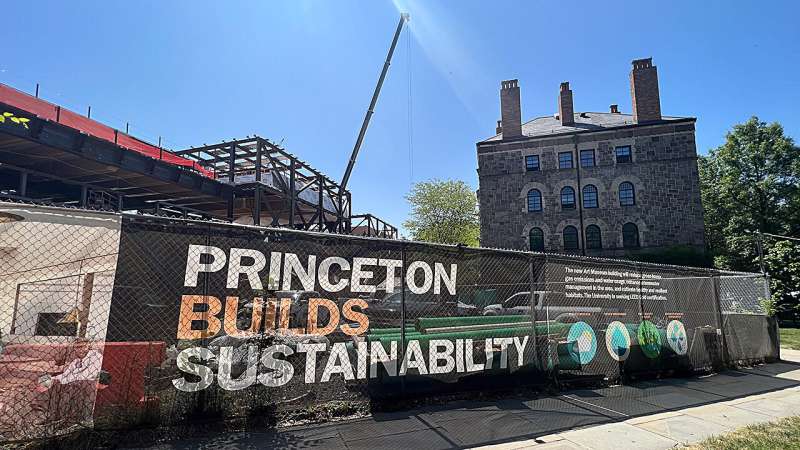Company culture shapes willingness of workers to act sustainably, research shows

Amidst rising concerns about the global climate crisis, Princeton researchers have uncovered the surprisingly large role that companies play in shaping sustainable behaviors among employees, as well as a link between eco-friendly behaviors and happier workers.
In research published in Current Research in Ecological and Social Psychology, the Princeton team reported the results from a nationwide study of employees to understand the factors that influence whether workers take sustainable actions and incorporate the environment into their day-to-day decision making.
The results highlighted the critical yet overlooked role of social and organizational factors in shaping sustainable behaviors. While the researchers did find that personal factors, such as whether people were concerned about climate change or whether they acted sustainably in their home lives, were important predictors of eco-friendly behaviors at work, they also found that independently from personal beliefs and behaviors, employees were more likely to act sustainably at work if they felt their actions were supported by their company and coworkers.
“We found that organizational signals matter hugely. They matter on top of individual attitudes and what people do in different contexts outside of work,” said Jordana Composto, a graduate student in psychology and the study’s first author. “If we only focus on changing individual attitudes and behaviors, then we totally miss the important role that organizational context plays in amplifying or dampening pro-environmental decisions.”
The results underline the importance of perception in shaping green behaviors among employees. For example, if people think their company or coworkers will disapprove of their actions to incorporate sustainability into their job tasks, people might avoid taking those pro-environmental actions, even if they personally believe in them. On the other hand, if workers think their company prioritizes sustainability, then those workers might be more likely to incorporate environmental outcomes into their daily job tasks, even if they are personally less concerned about climate change.
Moreover, Elke Weber, the Gerhard R. Andlinger Professor in Energy and the Environment and professor of psychology and public affairs, who led the research team, said the study documented a possible “virtuous cycle” between sustainable behaviors and overall job satisfaction, meaning that employees who reported taking sustainable actions at work also reported a higher level of job satisfaction. She said that the positive relationship between sustainable behaviors and job satisfaction could be an incentive for companies to take sustainability seriously at their organizations.
“The ability to express one’s values and beliefs actually does influence people’s happiness at work. That should get the attention of employers,” Weber said. “If companies can create an environment where their workers feel they can express their values, they could end up with happier and more engaged workers.”
The findings of the study parallel the theme of the Andlinger Center’s 2022 E-ffiliates Retreat, which spotlighted the ways in which organizations can harness insights from behavioral science to drive meaningful climate action and argued that behavior change within organizations can be a powerful climate mitigation tool.
“We know that organizational change is going to be critical to address the climate crisis,” Composto said. “And in this study, we showed that the impetus isn’t solely on employees to change their attitudes and behaviors. A lot of climate action has to be reinforced at the organizational level.”
The researchers also noted that their study comes in the midst of a generational shift in how many Americans think about their jobs and the role of companies in society. “Work is not just about bringing home the bacon anymore,” said Weber. “More and more, people are starting to expect that work should also supply some broader meaning to their lives and that companies have moral and social obligations as members of society.”
With the growing expectation that companies should act as responsible members of society, the researchers argued that more interdisciplinary approaches, such as the one they used for their study, are needed to understand how individuals exist and mediate their personal beliefs within a larger social and organizational framework. Such approaches are important for understanding how individuals in decision-making roles at companies can act to either facilitate or block overall organizational change.
“We don’t think enough about the interactions between individual and organizational action,” said Composto. “Understanding those dynamics is crucial to effective climate action from the private sector.”
While the researchers cautioned that their current work is strictly correlational, they are following up with experimental studies that could begin to tease apart the underlying causes of the relationships they observed between the various predictors of sustainable behaviors by employees.
In addition to Composto and Weber, Sara Constantino, assistant professor in psychology and public policy and urban affairs at Northeastern University and a visiting research scholar at Princeton’s Center for Policy Research on Energy and the Environment, was also an author on the study.
More information:
Jordana W. Composto et al, Predictors and consequences of pro-environmental behavior at work, Current Research in Ecological and Social Psychology (2023). DOI: 10.1016/j.cresp.2023.100107
Citation:
Company culture shapes willingness of workers to act sustainably, research shows (2023, June 20)
retrieved 20 June 2023
from https://phys.org/news/2023-06-company-culture-willingness-workers-sustainably.html
This document is subject to copyright. Apart from any fair dealing for the purpose of private study or research, no
part may be reproduced without the written permission. The content is provided for information purposes only.
For all the latest Science News Click Here
For the latest news and updates, follow us on Google News.

